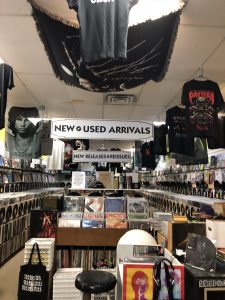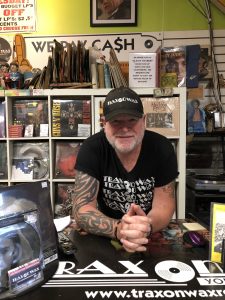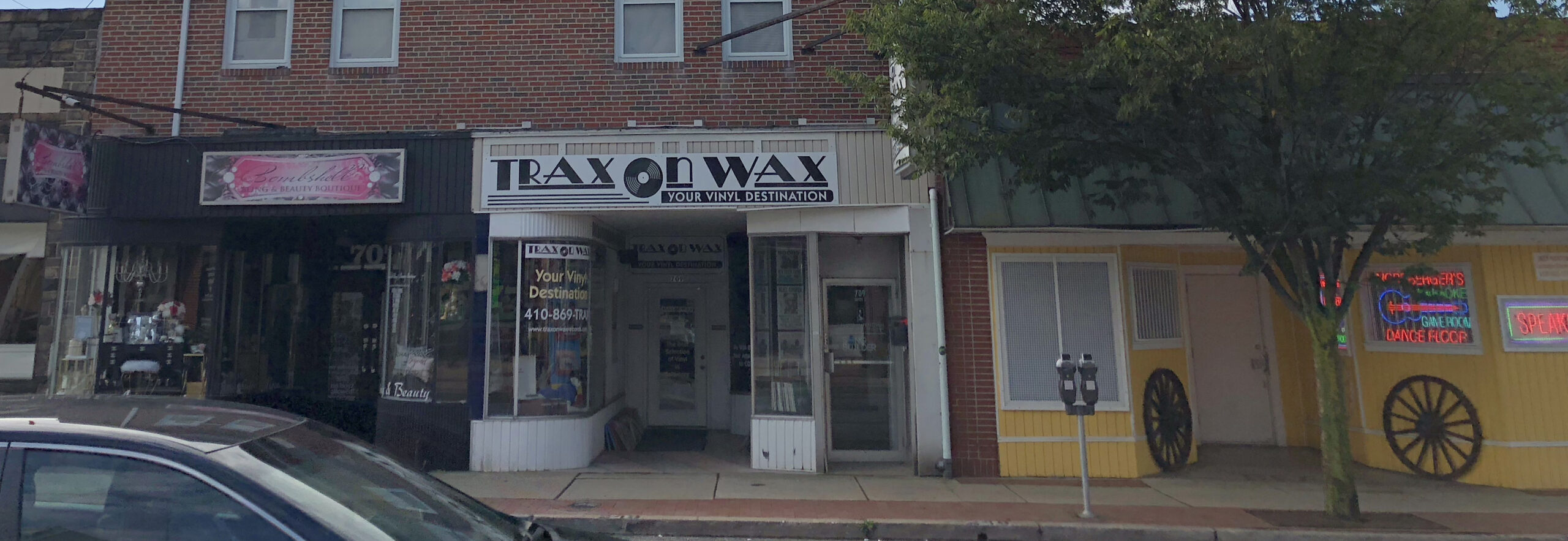
Enjoy this peek inside one of the most interesting spots in neighboring Catonsville (AKA, “Music City Maryland”), as told and photographed by UMBC editorial intern Anjali DasSarma ’21.
Tucked between a dive bar and a pretty pink beauty parlor lies Catonsville’s resident vinyl store: Trax on Wax. The light smell of incense hangs in the air of the store, emanating from bottles stacked neatly on the display shelves. The owner, Gary Gebler, has been selling records since he was 15 years old. Gebler is 60 now. He stands behind the counter, brown fedora perched jauntily on his head with thin silver hoops in each ear. His white scarf is tied in a loose knot around his neck and his black shirt underneath has the logo for the shop emboldened across the front, as he carefully wraps records in bubble wrap. The shop is packed with records in blue and green crates and wooden shelves, birds made of vinyl crafted by a local artist, bowls made of warped records, and anything else related to the vinyl industry.
Right when customers enter the store, they are greeted by rows of photographs of Gebler with icons like Tina Turner, all in the same style of thin black frames. Some are slightly tilted, and others are faded, but they all show the same thing: Gebler, with a slight smile on his face, standing next to an artist (oftentimes holding their own record proudly).
A Picture is Worth a Thousand Words

Each of the photos has a story behind it. One photo from around 1987 shows a young Gebler with a ginger beard next to Tina Turner. Gebler now sports whiskery white stubble, but the look in his pale blue eyes is the same as in the photo. “I met Tina Turner and she was huge at the time. We were instructed not to look her in the eye but then when we met her she was like ‘oh those guys, they do that all the time’ so she was really cool,” he says.
In the past, he was oftentimes invited out on stage to “just jam out” with artists like Bob Seger at Merriweather Post Pavilion. “Back in the day, I got to go out on the stage and play with him. I don’t play anything, they just put me behind the congas,” he says.
Gebler has an effortless way of talking, the kind of ease that only comes with years of experience. “The first day I went in and [sold records], I was still in high school. I thought to myself ‘well this is what I’m gonna do with the rest of my life,’ and I knew it! My day is still exactly the same day as when I was 15,” he says.
Silk tapestries and woven blankets hang from the ceiling alongside t-shirts with sayings like “Rocknroll Motherf&*er.” Next to the counter, there is a listening station, complete with a shiny leather stool and a pair of worn gray headphones plugged into a record player.
Growing Up With Vinyl

Trax on Wax has now been open for nine years. “When I first opened up, it was a bunch of old people like me, and so the people would come in and talk about their first concert. Then as the years progressed, there’s been a lot of younger people who are digging the store which is cool too. We get a lot of high school and college kids now and they come back on a regular basis, and it’s really cool to see them grow up,” he says.
Gebler doesn’t run Trax on Wax alone. His store manager, Jeff Ball, has been working in the vinyl industry, selling records or working in the entertainment section of department stores since 1986. He has been working at Trax on Wax for five years. He, like Gebler, found his interest in records early on, milling around vinyl shops as a teenager.
He took the summer off from working one year, and found himself at a party, where he ran into an old friend who encouraged him to come work at Towson’s Record and Tape Traders. “He said ‘I guarantee you’ll have a job right from the start.’ And it was true,” he says. The store manager, John Lewis, hired him on the spot. “I never filled out an application for a company that I worked for over twenty years. At that store, within a month or two I was manager.”
Ball now stands behind the counter wearing light blue jeans with a worn hole in the left knee and a green flannel casuallydraped over his black t-shirt with the Trax on Wax logo. He is ringing up a young woman who can’t be older than 25, who sets ten incense sticks on the glass surface. Ball taps the charge into the gray cash register, hitting the keys deliberately, before reading out the cost. The girl hands him the bills, and tells him to keep the change. He waves her back to the incense stand and tells her to “take a couple more sticks!” before she and her long-haired boyfriend leave the store.
Every store has its regulars, and Ball recalls one man named Danny from the “CD era… probably 1991” who would arrive every Tuesday when the store Ball worked at, Waxie Maxie’s, would get new arrivals and buy one of every single CD. “He had a good job, but he was quite the character. His car was loaded with bags and newspapers and you couldn’t even see out the back window, and my suspicion was that he was a hoarder. It was all great, but then suddenly Danny lost his job,” Ball says, his eyes widening a little. “He’d be begging his mother for money on the phone. It was like his drug, you know? I don’t know what happened to him after that.”
An Element of Danger

Even though both Gebler and Ball have followed similar routines their entire lives in the business, Ball’s involvement in the selling of bootleg records added an element of danger and excitement. Bootleg records are unauthorized, unreleased songs that are sold with no profit to the artist. Ball first heard about bootleg records at “rebellious” music store, Music Liberated. “They would actually go and slide a door open under the counter,” he says, gesturing to the smooth counter in front of him. “It was run by a bunch of hippies, and they had an F-U attitude to a lot of things.”
Ball himself was involved in the selling of bootlegs, especially Bruce Springsteen bootlegs, as the owner had a soft spot for his music. “Springsteen’s label had been in touch, because they got wind about how big we were. We even sent out mailers filled with nothing but bootlegs! One Monday, we had just opened. My employee showed up, hungover as usual. This guy walked into the store, bought a one dollar record and walks right out, doesn’t say a word. A couple minutes later, I’m standing at the counter, and I see the same guy walking up, and he’s got a state trooper with him, and I’m like ‘we’re going to get busted.’” he says, with a sly smile.
“This one guy comes out and says ‘picture time!’ and hands us each a bootleg. And I’m like ‘I’m not having my picture taken.’ And he goes, ‘oh really? Then let’s get in the car. We’re going downtown.’ And I said ‘where’s that record?’” Ball says, snatching a Smithereens album and holding it up like he would an identifier in a mugshot.
When it comes down to it though, excitement or not, Ball cherishes the feeling of listening to records. He, like Gebler, believes that vinyl makes the listener value the surrounding experience more than other forms that music takes on.
Gebler appreciates the aforementioned. “It just sounds good. It’s just a real interactive experience. Don’t get me wrong, I’m not a snob, I’ve got an iPod, I listen to CDs in my car,” he says, laughing. “But when I really wanna sit down and experience music, [vinyl is] how I prefer to do it. And luckily there’s enough people who want to do that too to keep me in business.”
And Gebler knows the value of history. Hanging above the door, facing inwards is a sign for the “Kozy Korner Record Shop” that closed in the late 70s. Gebler bought all of their old records when they closed down, but he left the sign up in Trax on Wax. “It’s good to keep that bit of history alive,” he says.




